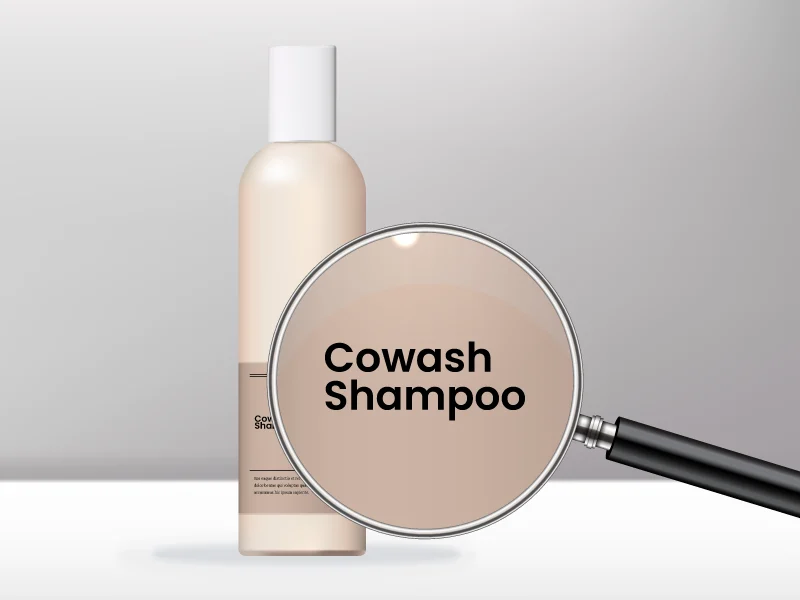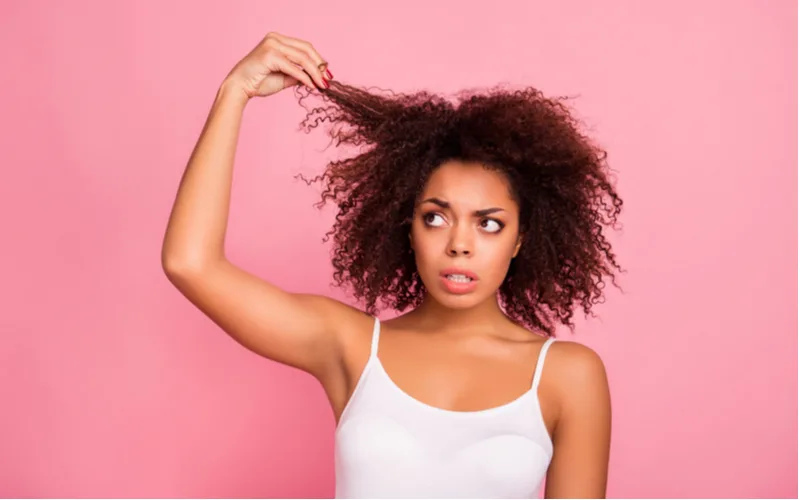Jump to:
People are always looking for the healthiest and most efficient way to clean their hair and make it look its best. One of the methods they use is cowashing.
This is a great way to clean your hair without sudsthat helps with dry or frizzy hair. This leads people to ask, “What is a cowash shampoo?” Don’t worry — we’ll explain in detail below.
What Is a Cowash Shampoo?

A cowash shampoo is conditioner-only washing, where you wash your hair with conditioner. It is a great option for people with coily, curly, or very dry hair, as it helps preserve the moisture and natural oils in your hair.
The sulfates in shampoo can dehydrate your hair, leaving it dry and fragile. You can counter this effect by cowashing as part of your regular hair care routine. If you have dry, curly, or fragile hair, this may sound like something worth trying.
Some questions that people have include:
- How do you cowash your hair?
- What ingredients should you look for?
- What hair types is this good for?
- Is there anyone who should avoid cowashing?
We had the same questions, and we found the answers. Continue reading to learn what you need to know about cowashing your hair.
How to Use a Cowashing Shampoo
You can cowash our hair by washing your hair with conditioner instead of shampoo. This works well for people with textured, coily, curly, or very dry hair because it adds moisture back into your hair. Many shampoos contain sulfates, which dry out your hair.
Although you will wash with conditioner, you should consider using a gentle shampoo that is free of sulfates once a week or once every ten days.
This is important because shampoos are designed to lift dried sweat, dead skin cells, hair products, dirt, and other pollutants from your hair. Conditioner is designed to hydrate and nourish your hair. The first step is to find the conditioner that is best for your hair.
You want it to be free of silicones, which can cause buildup. If you have oily hair, you may need to cowash daily, but some people can do it once or twice a week.
You should follow the same schedule that you use for washing your hair with shampoo; simply replace the shampoo with conditioner.
Make sure that your hair is wet, then massage your conditioner into all of your hair and throughout your scalp. Then, rinse the conditioner, and make sure that you rinse thoroughly. It’s a simple way to add moisture back into your hair so that it’s healthy and shiny.
Read Next: What Ingredients in Shampoo to Avoid
Important Ingredients in Cowashing Conditioners
Next, you want to make sure that you find a conditioner that is right for your hair. There are several different ingredients to look for to make sure that your hair is getting the treatment that you want. The goal is to hydrate and nourish your hair.
Emollients are ingredients that make your hair soft and smooth, and they prevent frizzing. They include shea butter, wheat germ, and oils. You should also look for proteins to protect your hair shafts, such as soy protein, wheat germ, and wheat.
Humectants help with water absorption and lock moisture into your hair, and they might include honey, vegetable glycerin, or panthenol. Finally, look for moisturizers to make your hair soft and shiny, including aloe vera or amino acids.
What Hair Types Benefit From Cowashing?

Roman Samborskyi/Shutterstock
Cowashing is ideal for people with thick, coarse hair. This includes people who have coils, curls, or dry hair. Although someone with fine hair may benefit from cowashing once in a while, it can make this type of hair more oily or flat.
Fine, straight hair easily absorbs the natural oils from the scalp, whereas the oils don’t always make their way to the ends in coily or curly hair. For this reason, these hair types benefit from extra help. When you have fine hair, you need to look for a conditioner with a lightweight formula that adds moisture without flattening your hair.
People with curly hair tend to have coarse strands, and they need the moisture locked in. For this hair type, you may want to let the conditioner sit for a few minutes so that it has a chance to penetrate the strands. Then, be sure to rinse it out completely.
People with coily hair, or type 4C hair, benefit greatly from cowashing. The hair is usually coarse and thick, and the coils can dry out very easily. With this hair type, you may want to cowash daily and look for a rich formula to add moisture back in.
If you have wavy hair, you will want to stick with a lighter formula. You don’t want too many oils because they can weigh down your hair and flatten your waves. Treat this hair type more similarly to fine hair.
Read Next: What Is My Hair Type? Quiz
Hair Types That Should Avoid Cowashing
Although cowashing is beneficial to many people, there are times when it may not be the best treatment. If you have fine, wavy hair or fine curls, cowashing can create buildup and lead to dull, flat hair.
These hair types can wash with a mild or gentle shampoo that is free of sulfates to ensure that dirt and other particles are removed without leaving any buildup on your scalp or hair.
Scalp buildup can lead to skin irritation and itchiness, and you will need to use stronger products to remove it. You can come up with a shampooing regimen that is ideal for your hair, but stick with shampoos that are free of sulfates rather than cowashing.
Frequently Asked Questions
If you cowash, should you ever use shampoo?
People often use a cowash as their regular shampoo treatment, and then they use a gentle shampoo once every week to ten days to lift dirt and other particles off their hair. When you get started, it’s best to experiment and find the right balance to keep your hair looking its best.
Is there a special conditioner for cowashing?
You can use any conditioner, but you want to make sure that it’s right for your hair type. Look through the ingredients and choose one that is nourishing and has the right amount of hydration for your hair.
So, What Is a Cowash Shampoo?
A cowash shampoo is where you wash your hair with conditioner. It’s a great option for people who need to nourish and hydrate their hair. If your hair is constantly dry or brittle, it may just need a little conditioner.
